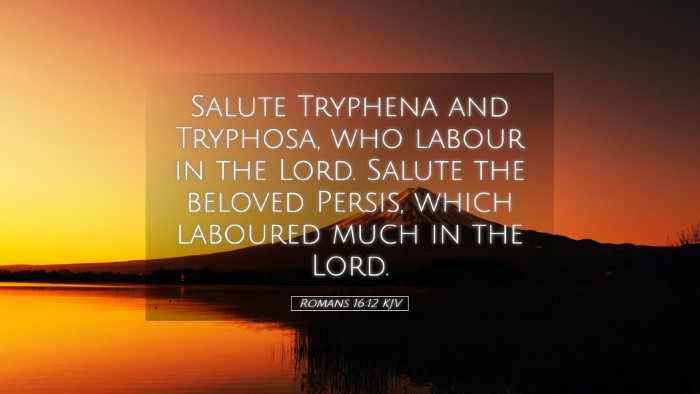Commentary on Romans 16:12
Verse: "Salute Tryphena and Tryphosa, who labored in the Lord. Salute the beloved Persis, which labored much in the Lord." (Romans 16:12)
Contextual Overview
The Apostle Paul, in his concluding remarks of the Epistle to the Romans, provides a list of greetings to various individuals in the Roman church. This section, though often overlooked, provides precious insights into the early Christian community and the role of women in the ministry. The mention of Tryphena, Tryphosa, and Persis underscores active participation in the labor of the Gospel.
Exegesis of Key Terms
- Tryphena and Tryphosa: The names are significant. They are likely derived from a Greek word meaning 'delicate' or 'luxurious', suggesting women of high society or refined character. Their inclusion here highlights that the labor in the Lord transcends social standing.
- Labor in the Lord: The Greek term for labor (κοπιάω) indicates a toil that is arduous and demanding. Paul acknowledges their hard work and dedication to the mission of Christ, positioning them as vital contributors to the early Church.
- Beloved Persis: Persis, noted as 'beloved', denotes a special affection from Paul. Her mention here indicates recognition not only of her work but also of her character, reflecting the essence of Christian community—love and respect.
Insights from Matthew Henry
Matthew Henry emphasizes the significance of these women, remarking that they were fellow laborers alongside Paul and the early apostles. He draws attention to the remarkable contribution of women in the service of the Gospel, illustrating that the call to service in Christ is inclusive of all believers, regardless of gender. Henry's commentary also suggests that their labor was not undertaken for mere visibility but stemmed from genuine devotion to Christ. He stresses the importance of recognition in the community of believers, as Paul honors their efforts in his letter.
Insights from Albert Barnes
Albert Barnes focuses on the idea of 'labored much in the Lord', indicating that Tryphena, Tryphosa, and Persis likely engaged in significant acts of service, possibly including teaching, hospitality, and other forms of ministry. Barnes suggests that their hard work set a precedent in the church, encouraging subsequent generations to follow suit in acts of service. He further notes that these women exemplified the principle of faithful service in the Christian community, regardless of societal constraints on women of that time.
Insights from Adam Clarke
Adam Clarke reflects on the dual nature of labor in the Lord. He posits that such labor can be both physical and spiritual, encompassing various forms of ministry. Clarke underscores the blessings that accompany work performed for Christ, indicating that this is an area where believers can find true fulfillment. He also discusses the cultural implications of women's contributions to the church, arguing that the scriptural affirmation of their roles stands in contrast to societal expectations of the apostolic age. Clarke lauds Paul for his commendation of women who served diligently, asserting that such acknowledgment encourages others in the faith.
Theological Implications
The passage speaks to the broader issue of inclusivity in ministry. It provides a counter-narrative to the traditional restrictions often placed on women, affirming their vital roles in the work of the Church. This becomes a theological standpoint asserting that every believer, regardless of gender, has a place in the mission of Christ. Paul’s inclusive greetings to Tryphena, Tryphosa, and Persis remind contemporary believers that God's call transcends gender roles and societal expectations. The recognition of these women serves as a template for modern congregations to affirm and empower both men and women in their ministry pursuits.
Practical Applications
- Encouragement of Service: Pastors and church leaders are encouraged to seek out and affirm the contributions of all members, promoting a culture of service and teamwork within the body of Christ.
- Highlighting Women's Roles: Churches should intentionally create opportunities for women to serve in significant roles, modeling the early church's inclusive attitude.
- Recognition of Contributions: It is essential for church leaders to recognize and celebrate the efforts of all who labor in service to the Lord, thus fostering unity and community spirit.
Conclusion
Romans 16:12 epitomizes the heart of the early church—a collective effort among believers to labor for the Lord. The commendations of Tryphena, Tryphosa, and Persis not only emphasize the significance of their contributions but also reflect a broader biblical principle of inclusivity. Paul’s words urge contemporary believers to honor those who work diligently for the Gospel, and they serve as a reminder that every effort, no matter how small, is valuable in the Kingdom of God. As we reflect on this passage, let us strive to emulate the example of these faithful servant-leaders in our communities today.


